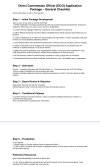Created this based on my process, hope it helps!
Direct Commission Officer (DCO) Application Package – General Checklist (Some information is only for Prior service)
Step 1 – Initial Package Development
Start as soon as you have a recruiter confirmed.
1. APSR (Application Processing and Summary Record)
Includes Motivational Statement.
Ensure the statement reflects why you want to serve and your qualifications.
2. Civilian Resume
Highlight leadership, operational, and management experience.
3. Officer Medical Screening
Use Navy Officer Candidate School (OCS) physical requirements as your baseline.
4. Letters of Reference (3–5 total)
From senior leaders (O4–O6 military or civilian equivalent preferred).
At least one should address leadership potential.
5. Commanding Officer (CO) Endorsement
Required if currently serving in the Navy (active or reserve).
6. Official Transcripts
From all colleges and universities attended.
Must be sent directly from the institution in sealed envelopes or via secure delivery.
7. Military Records (if applicable)
Last 3 Evaluations/FITREPs.
Active duty DD214 (Member 4 copy).
PSR (Performance Summary Report).
ASOSH (Annual Statement of Service History).
8. SF-86 (Security Clearance Questionnaire)
Complete in e-QIP or paper form as instructed.
9. Administrative Documents
Birth Certificate.
Social Security Card.
VA Disability Letter (if applicable).
Step 2 – Interviews
Format:
3 separate interviews with O5–O6 officers, or
1 panel interview with 3 O5–O6 officers.
Timing: Usually scheduled once all documents are ready.
Purpose: Evaluate leadership potential, professional experience, and fit for the Navy Reserve officer mission.
Step 3 – Board Review & Selection
Notification: Recruiter will call first if selected.
Official Selection Letter: Arrives by mail from Navy Recruiting Command.
Step 4 – Conditional Release
If currently enlisted in the Navy Reserve, submit a Conditional Release Request to transfer to a commissioned officer billet.
This is required before accepting your commission.
Step 5 – Finalization
Once selected:
1. Ready Reserve Transfer Request Service Agreement (RRA).
2. Oath of Office.
Schedule with recruiter or designated officer.
Ensure proper uniform or business attire and document signing.
Reference Resources
Reserve Officer DCO checklist: Documentation guide for Navy Direct Commission Officer (DCO) applicant requirements.

www.kellybeamsley.com
Pro Tip: Keep a digital and physical binder with all documents, forms, and communications. Track deadlines and follow up weekly with your recruiter.


